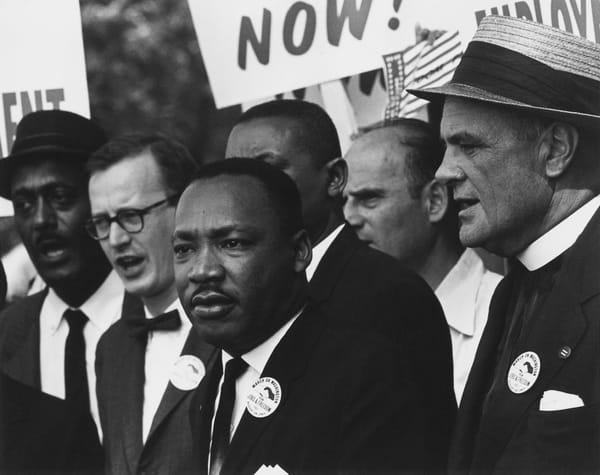Martin Luther King Jr. appealed to Augustine and Aquinas to justify resisting racist laws. He elevated character high above skin color and moral universalism above separatism of all kinds. His political claims were grounded in America’s founding promises, his message garbed in a high-minded, critical patriotism. He called the United States his “beloved nation,” even as he denounced Washington’s forever war in Vietnam. At a moment of profound polarization, King is one of the few figures who can still supply us with unifying themes.
So naturally, some in the more excitable corners of the right have been taking an ax to his legacy. The latest comer is Turning Point USA founder Charlie Kirk, who last week declared that “MLK was awful,” and vowed: “We’re gonna be hitting him next week. Yeah, on the day of the Iowa caucus, it’s MLK Day. We’re gonna do the thing you’re not supposed to do. We’re gonna tell the truth about MLK Jr.”
Civic pieties should be scrutinized in the light of later historiography, to be sure. But that isn’t what the MLK haters are up to. Their anti-MLK crusade is the mirror image of progressive efforts to discredit national icons and narratives. Ironically, MLK himself has also been the target of such attempts from the left, on the grounds that his moderation stunted more radical projects of racial liberation.
“The United States, like every other nation, boasts plenty of flawed heroes.”
The anti-MLK turn on the right is an about-face of sorts. Until recently, conservatives of even the Kirk variety tried to claim MLK as one of their own; indeed, Kirk himself in years past hailed him as a moral “hero.” But if these earlier attempts to appropriate King as a crypto-conservative were naively ahistorical, they nevertheless flowed from good intentions: a desire on the right to come to terms with the secular canonization of a figure who spoke from within a radical strain in American Protestantism and the prophetic voice of the black church.
King heralded the forceful—and politically effective—return of these traditions. This, after decades during which they were muffled by a Whiggish Protestantism that, beginning in the mid-19th century, had taught the faithful to abandon social emancipation in favor of individual salvation and self-improvement. For conservative Christians to accept King as an object of reverence, then, represented a healthy reconciliation within both church and society.
What sorts of intentions lie behind the effort to disrupt this long reconciliation? The iconoclasts make no bones about this: King and his civil-rights movement, said Kirk, inaugurated a “permanent DEI-type bureaucracy” that today threatens freedom of speech and enables antiwhite discrimination. This is a debatable proposition. At its core, the civil-rights movement fought to revive the ancient common-law principle that public services and accommodations can’t discriminate unreasonably. The suspension of that principle in the Jim Crow South had given rise to separate water fountains, separate schools, white-only hotels, and other such moral obscenities. We honor Martin Luther King Jr. for leading a nonviolent struggle that made such practices first illegal, then unthinkable.
The fact that he could be a cad, or that his doctoral dissertation contained instances of plagiarism and other citation problems, or whatever other of the well-known black marks on King’s character that Kirk et al. might marshal—none of these has so far sufficed to dislodge his place in the American pantheon. And this is for the simple reason that in the broad judgment of American memory, his overcoming de jure Apartheid in the South remains a monumental achievement, next to which these personal shortcomings pale.
The question Kirk and likeminded right-wing iconoclasts must ask themselves is whether they are truly prepared to undo the achievements of the civil-rights movement in their hatred for the legal developments that have transpired since 1964—in other words, to make the case that Jim Crow-style laws are acceptable. If they aren’t, then talk of destroying King’s legacy will only serve to further their own marginalization from the American mainstream, given that the overwhelming majority of their compatriots view King’s legacy positively. And if they are prepared to rethink the entire civil-rights revolution, well then … let’s have that ugly debate out in the open, instead of channeling it into tired accusations about the man’s plagiarism, womanizing, Communist Party links, and the like.
Much the same holds true for many of the other leaders whom Americans memorialize at our nation’s capital and public squares across the land. The United States, like every other nation, boasts plenty of flawed heroes. Until fairly recently, we possessed the maturity to live with these ambiguities. Today, however, each side of our polarized politics seeks to take down the other’s statues. The two sides are thus operating according to a logic of mutually assured cultural destruction. If they have their way, the rest of us will soon be bereft of any common stories and heroes—and of the common loves that make a commonweal.
Martin Luther King Jr. was a moral hero. May we continue to honor his legacy in the 21st century.
